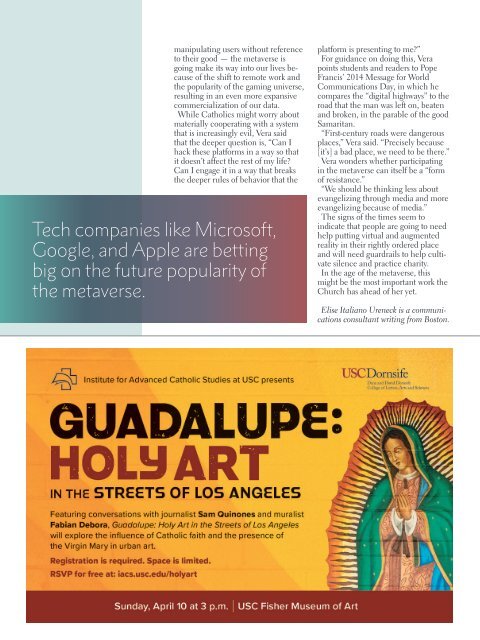Angelus News | April 8, 2022 | Vol. 7 No. 7
On the cover: The notion of the “metaverse,” touted by tech executives like Facebook’s Mark Zuckerberg, is no longer a far-off idea. In fact, we may be gradually entering it through our growing reliance on gadgets and the internet to get through daily life. On Page 12, Elise Ureneck looks into where the metaverse wants to take us and whether people of faith should resist or try to shape a world that isn’t totally “real.”
On the cover: The notion of the “metaverse,” touted by tech executives like Facebook’s Mark Zuckerberg, is no longer a far-off idea. In fact, we may be gradually entering it through our growing reliance on gadgets and the internet to get through daily life. On Page 12, Elise Ureneck looks into where the metaverse wants to take us and whether people of faith should resist or try to shape a world that isn’t totally “real.”
You also want an ePaper? Increase the reach of your titles
YUMPU automatically turns print PDFs into web optimized ePapers that Google loves.
manipulating users without reference<br />
to their good — the metaverse is<br />
going make its way into our lives because<br />
of the shift to remote work and<br />
the popularity of the gaming universe,<br />
resulting in an even more expansive<br />
commercialization of our data.<br />
While Catholics might worry about<br />
materially cooperating with a system<br />
that is increasingly evil, Vera said<br />
that the deeper question is, “Can I<br />
hack these platforms in a way so that<br />
it doesn’t affect the rest of my life?<br />
Can I engage it in a way that breaks<br />
the deeper rules of behavior that the<br />
Tech companies like Microsoft,<br />
Google, and Apple are betting<br />
big on the future popularity of<br />
the metaverse.<br />
platform is presenting to me?”<br />
For guidance on doing this, Vera<br />
points students and readers to Pope<br />
Francis’ 2014 Message for World<br />
Communications Day, in which he<br />
compares the “digital highways” to the<br />
road that the man was left on, beaten<br />
and broken, in the parable of the good<br />
Samaritan.<br />
“First-century roads were dangerous<br />
places,” Vera said. “Precisely because<br />
[it’s] a bad place, we need to be there.”<br />
Vera wonders whether participating<br />
in the metaverse can itself be a “form<br />
of resistance.”<br />
“We should be thinking less about<br />
evangelizing through media and more<br />
evangelizing because of media.”<br />
The signs of the times seem to<br />
indicate that people are going to need<br />
help putting virtual and augmented<br />
reality in their rightly ordered place<br />
and will need guardrails to help cultivate<br />
silence and practice charity.<br />
In the age of the metaverse, this<br />
might be the most important work the<br />
Church has ahead of her yet.<br />
Elise Italiano Ureneck is a communications<br />
consultant writing from Boston.


















